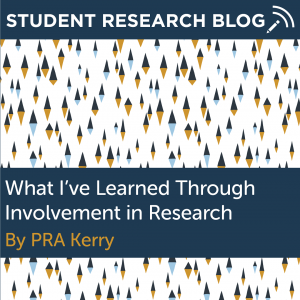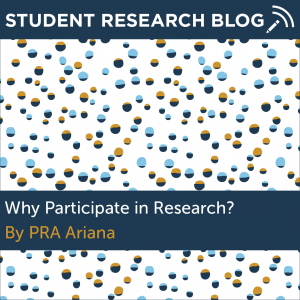Meet Pavitra Makarla ’21, an OUR Peer Research Ambassador (PRA) majoring in Cognitive Science and minoring in Neuroscience and Psychological Sciences.
What is the focus of your research?
I currently study literal (positive and negative) and nonliteral (sarcasm and jocularity/teasing) language exchanges, and how they are affected by individual differences between people (including differences in prosody/intonation, facial expressions, gestures, etc.). Sarcasm and jocularity are considered to be two very complex language functions because of how much effort is required to understand statements beyond their literal meaning. We recently used eye tracking to monitor where people look during a conversation that involves the use of literal and nonliteral language— they either look at the Asker, the one asking the question, or the Responder, the one responding in a literal/nonliteral manner. We also tested how long they look, and how many people tend to look at either the Asker or the Responder.
Why did you get involved in research?
I decided that I wanted to explore research the summer after my freshman year. I knew that research was a big part of my major and the skills I would get would be applicable regardless of what I ended up doing, so I went ahead and conducted an independent research project based on my interests. That project made me realize I wanted to pursue research much more vigorously at UConn itself, especially since I needed a little more structure to what I was exploring, so I decided to join a lab my sophomore year.
What advice would you give to incoming first-year students?
Don’t give up! If you don’t get into the lab of your choice the first time, that’s okay! Keep applying to labs that are exploring ideas similar to your interests. If you get into one of those, that’s great! Now you can get even more research experience. If you feel that you still want to get into that first lab that you weren’t able to get in, after that one year of experience, they might be more willing to take you — apply again! There’s no one set path to getting the lab you want, and if you keep pushing towards your goal, you’ll be all set!
What do you enjoy the most about participating in research? Describe the impact your research experience has had on you.
I think there is a unique sort of joy that comes with participating in research. It might be the relief that comes with finally finishing data collection, or getting revisions back with extremely helpful critiques instead of getting rejected, or maybe it’s the delayed gratification that comes from finally publishing a paper. There is also a certain joy in getting data that doesn’t make sense, or hitting a wall in your flow of research ideas. There is never a dull moment when it comes to research, and I think there is beauty in the fact that the process can almost never be perfect all the way through. It’s the problem solving, the constant remedying, the creativity that really makes research the enlightening field it is.
What is your greatest accomplishment so far?
In research, one of the best feelings is getting a paper published; but, an even better feeling is knowing that you will be listed as second author on the paper as an undergraduate research student. I had the opportunity to work on two related papers simultaneously, one of which is a paper to be published in a special edition journal, and have both papers in the process of revisions— one step closer to official publication.
Click here for more information on Pavitra and other OUR Peer Research Ambassadors.







